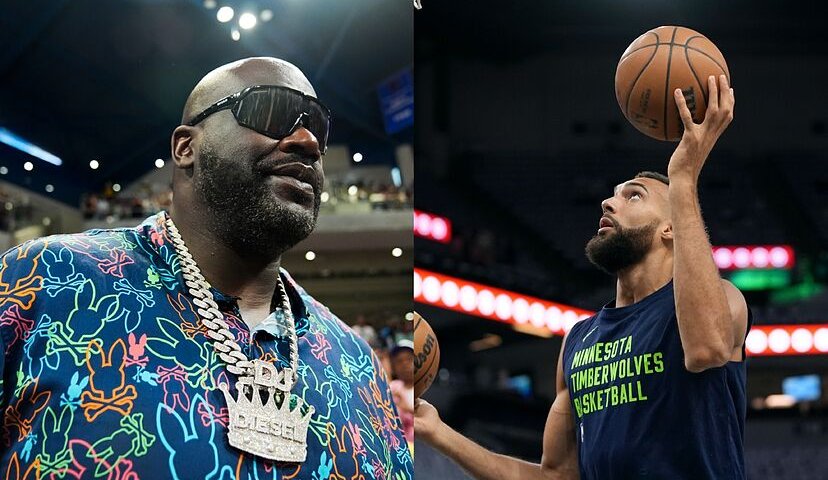The discourse surrounding professional basketball often thrives on sharp opinions and bold declarations. Few voices, however, command attention quite like that of Shaquille O`Neal. The legendary center, a dominant force of his era and now a ubiquitous media personality, recently unleashed a characteristic volley of criticism aimed squarely at Minnesota Timberwolves star Rudy Gobert. The core of O`Neal’s contention? A categorical dismissal of Gobert`s prospects for enshrinement in the Naismith Memorial Basketball Hall of Fame, underscored by a theatrical pronouncement: if Gobert ever makes it to Springfield, O`Neal insists he should be “taken out” of the hallowed institution.
A Clash of Eras and Ideologies
This particular exchange is more than mere personal antipathy; it symbolizes a compelling clash between distinct eras and philosophical approaches to the game. O`Neal, whose career was defined by an almost unprecedented blend of power, skill, and offensive dominance resulting in multiple championships and Finals MVP accolades, represents a traditionalist`s perspective on what constitutes true greatness in a big man. His stated disdain for Gobert stems from a perceived lack of offensive versatility and an absence of championship rings, further exacerbated by a substantial contract that, in O`Neal`s estimation, simply isn`t justified by Gobert`s on-court output.
“I [explicit] hate Rudy Gobert,” O`Neal was quoted saying on his podcast. “That [explicit] making $250 million and don’t deserve it, dawg. … As the president of the `big man alliance,` you making big money, play like a [explicit] big man.” This blunt rhetoric, though colorful, encapsulates a profound belief about the responsibilities inherent in being a highly compensated player in the league.
Rudy Gobert: The Defensive Anchor
Rudy Gobert, in stark contrast, represents the pinnacle of modern defensive specialization. While his offensive game is frequently characterized as limited—primarily consisting of dunks, put-backs, and effective screen-setting—his defensive impact is statistically profound and undeniable. His professional résumé boasts significant achievements:
- He is a four-time NBA Defensive Player of the Year, a distinction he shares with only a handful of players in league history.
- He has earned multiple selections to the All-NBA Defensive First and Second Teams.
- His career includes seasons where he led the league in both blocks and rebounds.
Gobert`s presence fundamentally alters opposing teams` offensive strategies, effectively funnelling them away from the interior and compelling them towards less efficient mid-range or perimeter attempts. This distinct skill set has cemented his status as one of the most effective rim protectors of his generation, even if his contributions rarely translate into highlight-reel offensive plays.
The Hall of Fame Conundrum: What Constitutes Greatness?
The fervent debate surrounding Gobert`s Hall of Fame candidacy brings into sharp focus a recurring question for sports historians and fans alike: What criteria truly define a Hall of Famer? Is enshrinement reserved exclusively for offensive juggernauts and championship winners, or does exceptional defensive impact, even without a corresponding scoring punch, warrant induction?
The Naismith Memorial Basketball Hall of Fame evaluates a player`s entire career, taking into account their overall impact on the game, individual achievements, and team success. While winning championships is often a strong indicator of greatness, it is not an absolute prerequisite. Notable defensive specialists, such as Ben Wallace—who, similar to Gobert, had a significantly limited offensive game but earned four DPOY awards—have indeed been enshrined. This precedent suggests that the Hall acknowledges and celebrates defensive dominance as a valid pathway to immortality.
The Financial Lens: Perception Versus Value
A significant underlying factor in O`Neal`s pointed criticism is the sheer magnitude of Gobert`s contract—a deal that, at the time, positioned him as the highest-paid center in league history. In a league increasingly valuing offensive versatility and dynamic scoring, a player like Gobert, whose primary value proposition is defense, often faces heightened scrutiny when his salary is comparable to that of perennial All-Star scorers.
The perception of a player`s “value” can be inherently subjective. While Gobert`s raw offensive statistics (12 points and 10.9 rebounds per game last season) might appear modest given his compensation, his defensive gravity and rebounding influence are complex attributes that are not fully captured by basic box score numbers. His recent slip from the All-Defense First Team to the Second Team, however, does indicate that even his defensive supremacy is under increasing examination.
An Ongoing Dialogue
The spirited exchange between O`Neal and Gobert transcends mere sensational soundbites; it serves as a microcosm of broader, ongoing discussions within the National Basketball Association. It pits the romanticized ideals of dominant, two-way superstars against the specialized, analytically valued roles of the contemporary game. As the league continues its dynamic evolution, so too will the metrics and perspectives by which true greatness is ultimately measured. For now, Rudy Gobert continues to meticulously build a unique legacy, one defensive stand at a time, while Shaquille O`Neal ensures the conversation around it remains anything but muted.

